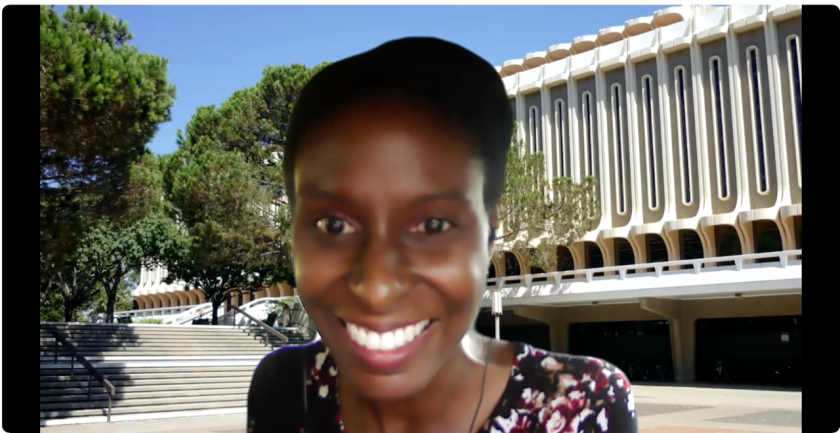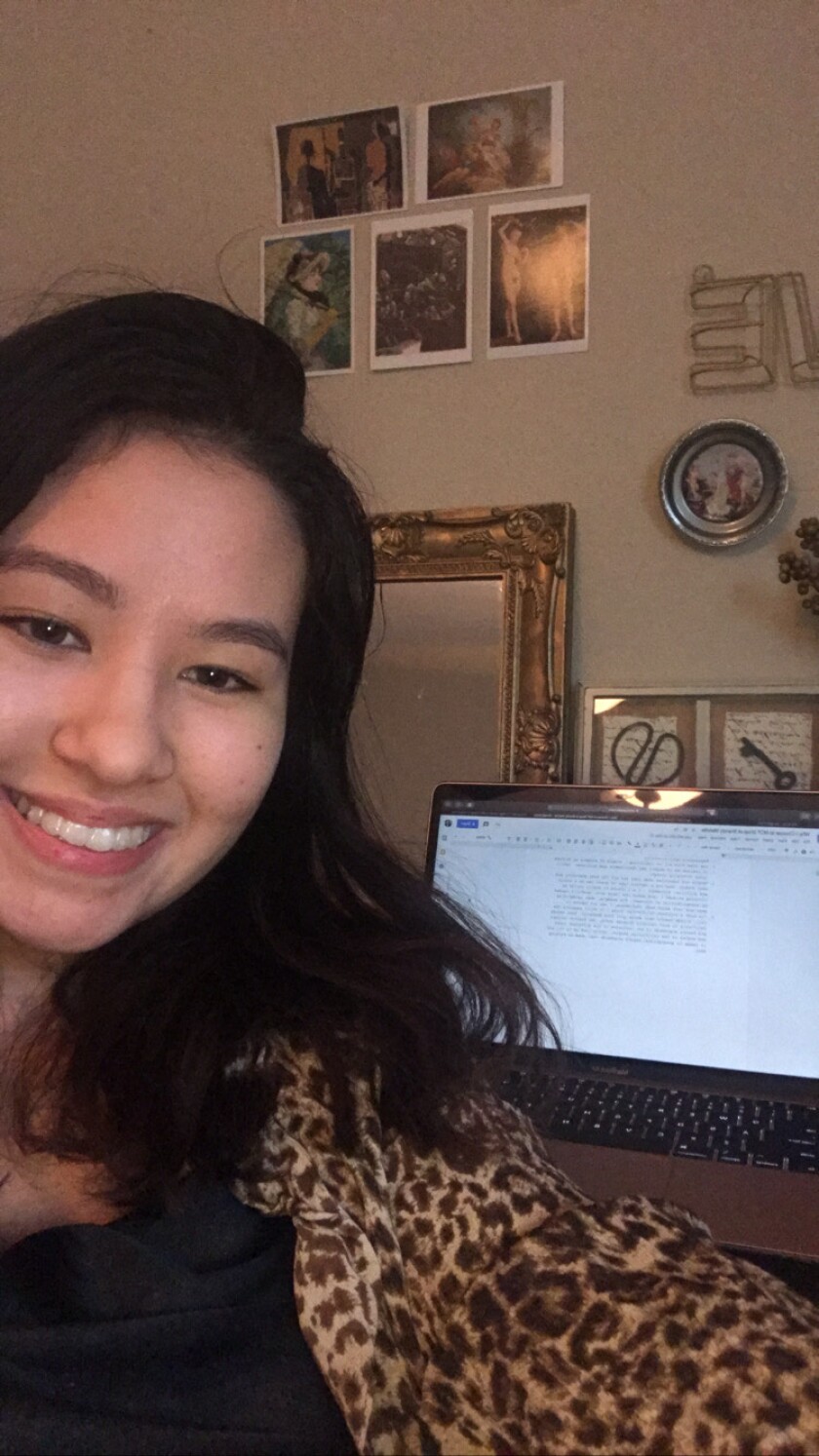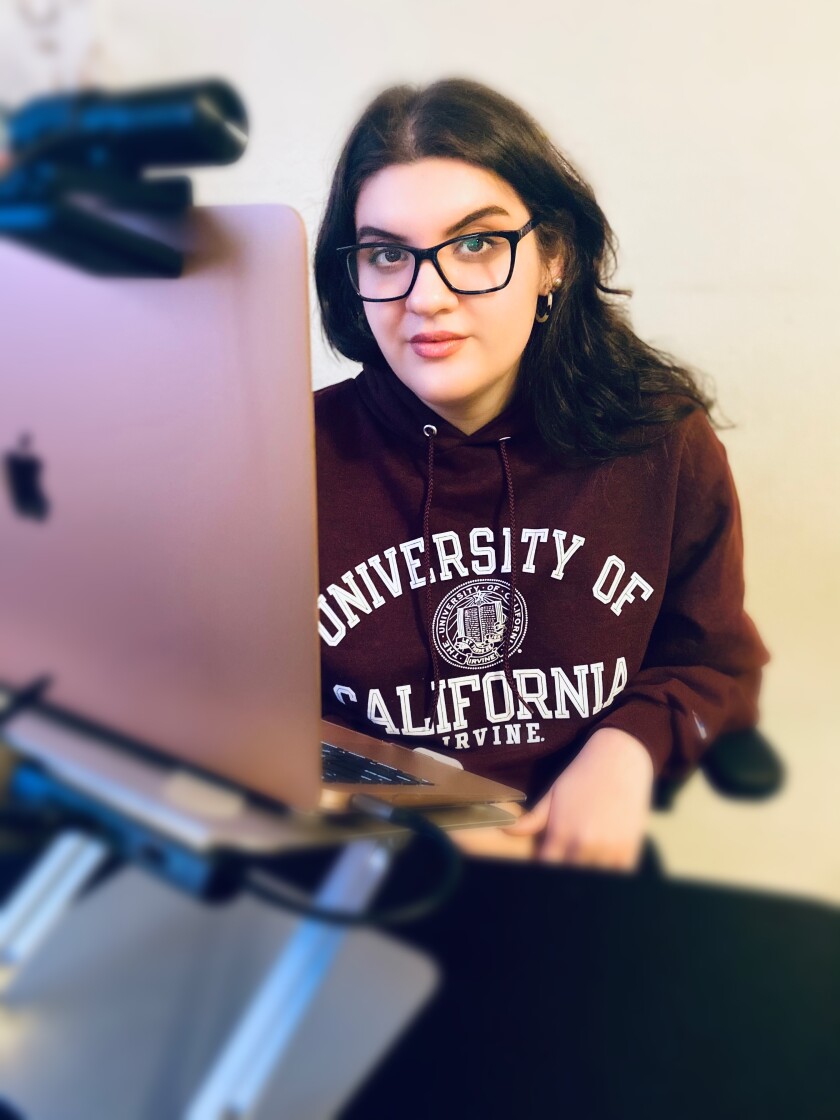Read about our project in the UC Irvine School of Humanities newsletter

Sea stories
Share: Office of the Dean May 27, 2021
UCI students record community’s connection to the ocean through oral history project
By Megan Cole
A photo essay showcasing the history of Japanese American farmers in coastal Orange County. A series of digital portraits of marine life, coupled with warnings about habitat loss. A children’s book starring two coxswains on UCI’s Crew team. A podcast on whales. These are just a few of the student-led creative projects resulting from Stories from the Sea: An Oral History Project, a yearlong UCI Humanities Center program designed to train students on collecting, creating and curating diverse narratives about Southern Californians’ relationships with the oceans. Under the direction of UCI Humanities Center Director Judy Tzu-Chun Wu, the program launched in fall 2020 with 35 undergraduates.
“The Stories from the Sea project is inspired by the ‘Oceans’ theme of the Humanities Center,” Wu says. “Oceans and seas evoke powerful emotional associations, and we sought to capture some of these meaningful stories. In addition, the Newport Beach Public Library Foundation was eager to collaborate with UCI, particularly with our students, to record and share stories about our local community. This was a new approach towards community collaboration.”
The Newport Beach Public Library Foundation, Balboa Museum and the Sacred Places Institute for Indigenous Peoples were just a few of the program’s host institutions. The Newport Beach Public Library Foundation played an especially important role in the formation of the program. Their team not only helped plan the program, but also secured two grants from California Humanities and the Isidore & Penny Meyers Foundation to support the students.
“These oral history projects are multimedia, multigenerational ways of documenting community members’ firsthand accounts of local coastal areas,” said Kunga Wangmo-Upshaw, director of programs at the Newport Beach Public Library Foundation, at a recent symposium celebrating the program’s culmination. Wangmo-Upshaw explained that this work is crucial because “here in Southern California, oceans have always been the center of community life.”
During the fall and winter, students worked closely with faculty and staff in UCI’s Humanities Center, Center for Storytelling, Libraries, the Department of History and the Literary Journalism Program to hone their skills in reporting, interviewing, conducting archival research and curating their projects. Students were then paired with local institutions as intern storytellers in order to begin gathering and researching ocean-related narratives. A handful of students worked on their projects independently, without a host institution, working off of their interviews.
Paul Wormser, library director of Sherman Library and Gardens — a local research library on the history of the Pacific Southwest, and one of the program’s community partners — believes that students’ Stories from the Sea projects have already been instrumental to documenting and memorializing ever-shifting local histories.
“Newport Beach is such a rapidly changing area,” says Wormser. “Documenting the memories of people who have lived here for decades is so crucial to capture memories and preserve the untold histories of this community before they fade away.”
To this end, UCI Research Librarian and Curator for Orange County Regional History Krystal Tribbett taught student interns the archiving, cataloguing and curating skills that would be necessary not only to share their projects with the wider community, but also to preserve them for future generations.
“Once we excavate oral histories, it’s crucial to preserve them, because they provide such a wonderful opportunity to fill in historical gaps,” says Tribbett, adding that UCI Libraries will be the archival home of students’ Stories from the Sea projects. “These projects allow us to hear the voices of those who live, work, and interact with the sea — voices that tend to be underrepresented and marginalized in the historical records we have. There’s true value in hearing their experiences firsthand.”
Kaye Bilbao Regalado, a literary journalism major and Stories from the Sea intern, joined the program in hopes of amplifying underrepresented community voices while exploring her twin passions for storytelling and marine life. She interviewed the staff of the Pacific Marine Mammal Center (PMMC), a Laguna Beach nonprofit that rehabilitates marine life, and created digital portraits of their rescue seals coupled with environmentalist advice from PMMC employees (pictured above). For Regalado, the experience was as therapeutic as it was informative.
“On the level of a community, times when people are stuck at home are times when people desire most to reconnect — not just to the external world in general, but more so to nature,” says Regalado. “The Stories from the Sea project is a narrative bridge back to the beautiful, vast ocean world many have missed during these isolated times.”
Associate Director of the Literary Journalism Program Patricia Pierson, who both taught students reporting skills in the fall and is one of the program’s leaders, appreciates that the Stories from the Sea project not only produced a trove of creative historical work, but also brought community members together during an otherwise isolating year.
“Members of the community were able to come into our classrooms and share their knowledge and expertise with our students, which I think was a really enriching experience for everyone,” says Pierson. “Others formed connections with faculty and students that they might not have ever met or spoken to if this program had not existed. A real unexpected silver lining of this project for all of us was the meaningful and enriching connections we all formed as part of this diverse learning community.”
In the near future, Wu looks forward to creating additional programs and internships focused on building connections, strengthening community relationships and communicating across barriers. After all, Wu adds, these experiences are critical to students’ academic and professional development and to preserving the community’s history.
“Through this program, students developed connections to educational and community organizations, and at least one of them received a summer internship from these connections,” Wu says. “This has been such an empowering experience for the students, especially in a time of remote learning. The Stories from the Sea project allowed the students to connect to one another and to members of the community. Through these connections, the project was able to preserve and share meaningful stories from the sea.”
Click here to view the stories captured by Stories from the Sea student participants.
Article reposted courtesy of the UCI School of Humanities.
Read about our project in the Los Angeles Times
UCI Humanities Center and Newport Beach Public Library Foundation preserve ‘Stories from the Sea’

By LILLY NGUYEN STAFF WRITER
NOV. 19, 2020 6:34 PM PT
The UC Irvine Humanities Center and the Newport Beach Public Library Foundation are setting sail to find “Stories from the Sea” — an oral history project that looks to document personal memories and encounters with the sea for current and former residents of the Newport Beach bay and coastline.
“We do a lot of partnerships with UCI. We have the ‘Medicine in Our Backyard’ program and lots of connections with faculty,” said Meg Linton, the chief executive officer for the Newport Beach Public Library Foundation. “When [Judy Wu, the director of the UCI Humanities Center] came in, we started talking.”
Linton said that the idea to do an oral history project surfaced.
She said the project would help the foundation get to know the library’s patrons while also facilitating multigenerational exchanges between the almost 40 students participating.
For Wu, the project is about teaching students how to become storytellers and record the memories of people in nearby Newport Beach. Wu said that since taking on the role of director of the UCI Humanities Center last year, she said the center’s tried to emphasize engagement with the community.
“This year, our big theme is focusing on the ocean. It’s a way to think about the connections between continents,” Wu said.
The project is paid for with $24,000 in grants from California Humanities and the Isidore and Penny Myers Foundation.

“We also wanted to have this undergraduate research innovation component as well. We wanted to train students to become storytellers, to record really important personal memories,” Wu said.
Plans were to have students use resources in the library such as its recording and media labs to conduct interviews for “Stories from the Sea.” But as with all plans this year, organizers pivoted online because of the pandemic.
Students are currently taking a literary journalism class with Patricia Pierson, the associate director for the university’s literary journalism program. Pierson said she’s taught the class for 14 years and it is often tailored to bring students into projects in the department. This year’s dovetails the “Stories from the Sea” internship.

“This is our largest cohort ever and what’s been really interesting is that we have students coming from the ‘Stories from the Sea’ internship through this class from different disciplines and humanities programs like Humanities Out There,” Pierson said.
Pierson said the class and project have been a great opportunity to bring together a diverse group of educators, community members and interested students. Typically, she said the literary journalism course sees class sizes of about 15 to 17 students.
As for what the students are recording and examining, it’s flexible.
Pierson said students are free to explore topics they’re interested in. Some have clearer ideas, while others aren’t entirely sure. Students are organized into five groups until the end of the quarter, focusing on topics that include the environment, food, immigration, art, architecture and landmarks and ocean sports.

Rehana Morita, a second-year film and media studies major, said she’s studying the history of Japanese Americans in Newport Beach.
Morita said that growing up, she never knew many Japanese people and she wanted to focus her research on communities of color in Orange County. She said she recently learned Japanese Americans lived in Newport Beach until WWII, when the U.S. sent Japanese Americans to internment camps, a part of history she feels isn’t acknowledged well in schools.
“Since the pandemic started, a lot of the Asian community has experienced xenophobia, and I felt it was important to highlight stories about Asians in general, and I think it’s important to share stories about families that were affected by internment,” Morita said. “There’s a lot of intergenerational trauma.”
Fourth-year comparative literature and Asian American studies major Vian Nguyen said she’d initially wanted to reach out to the indigenous communities that lived in Newport Beach to hear about their relationship to the sea. She said she wanted to compare that to current residents and their own perspective.
“If COVID wasn’t a thing, I would really like to get in touch with the community, volunteer and show up more physically before I asked them for the labor of their time,” Nguyen said.
“That’s the same with our other narrators as well. I’m really grateful for their time and their effort in speaking with me, but I know from the talk [Angela Mooney D’Arcy] gave,” Nguyen said. “It takes a lot of time to build that kind of trust with the indigenous community and so we have to respect that.”
She said she pivoted to an examination of how Newport Beach built a community and how others could mirror that instead.
Both Morita and Nguyen said they’re still in the planning phase. Pierson said students will be refining their research in the upcoming winter quarter. By spring, they’ll be presenting some of the stories recorded in a virtual event and also present creative projects inspired by their research throughout the academic year.

“There is an intimacy that’s created in the best oral histories,” Wu said. “You have this connection with this person you’re talking to. The emotion or the physicality of it — I think you can capture the sense of emotion.”
“Not everything that’s happened in the past has equal weight. Not everyone sees the past in the same way. When you talk to someone, you get a sense of how they experienced history,” Wu said.
“It’s both the bottom-up version of history, but it’s also a more intimate history. We could do a version of this project where it’s just repeating the P.R. version of Newport Beach,” Wu said, “but we really want to get more at the hidden history of Newport Beach. The people that might not necessarily get the light of day.”
The Newport Beach Public Library Foundation is still looking for people out in the community to participate in the “Stories from the Sea” project who might have a good story and a willingness to share any documentation they might have such as photos, film or objects.
Interested readers can apply at bit.ly/35JPW7w.
Article reposted courtesy of the Los Angeles Times.